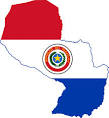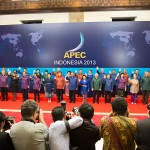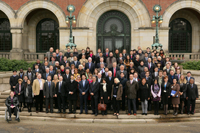 Over fifty years after the Hague Convention of 5 October 1961 Abolishing the Requirement of Legalisation for Foreign Public Documents (the “Apostille Convention”), Paraguay officially adopted the Apostille Convention and has deposited its instrument of acceptance on December 10th, 2013. However, the Hague Convention will not come into effect until 30 August 2014 for Paraguay.
Over fifty years after the Hague Convention of 5 October 1961 Abolishing the Requirement of Legalisation for Foreign Public Documents (the “Apostille Convention”), Paraguay officially adopted the Apostille Convention and has deposited its instrument of acceptance on December 10th, 2013. However, the Hague Convention will not come into effect until 30 August 2014 for Paraguay.
Legalization
Scam Artists Trick Homebuyers with Fake Apostille
 A disturbing trend has emerged in home buying in Indiana and all over the country: scam artists tricking people into illegitimate home sales by using authentications from the Secretary of State to create the illusion that they own vacant property.
A disturbing trend has emerged in home buying in Indiana and all over the country: scam artists tricking people into illegitimate home sales by using authentications from the Secretary of State to create the illusion that they own vacant property.
The scammers call themselves “sovereign citizens.” They refuse to follow the law, do not accept the American government as legitimate, and are recognized by the government as domestic terrorists.
They use apostilles and authentications that are meant to be used solely for international business or other transactions that have absolutely nothing to do with property. Many people are not even aware that they have been targeted until they try to buy and sell property, at which point they have already fallen victim to the scheme.
Although previously the Secretary of State did not have the authority to reject financing statements or liens, it is now able to reject fraudulent filings. This new power will protect home buyers, civic leaders, and members of law enforcement from being conned by criminals.
Apostilles on Criminal Background Checks
 Many employers require a criminal background check as part of their employment process. In order to get a Georiga apostille, or Great Seal, you need to first get your fingerprints taken. Find out whether your employer would like you to get digital or ink fingerprints done for the background check. In Atlanta, companies doing ink fingerprinting are difficult to find; however, a good fingerprinting company is Atlanta Notaries (www.atlantanotaries.com) which can get you in and out of their office in 10 minutes with fingerprints on the FBI FD-258 cards (see left).
Many employers require a criminal background check as part of their employment process. In order to get a Georiga apostille, or Great Seal, you need to first get your fingerprints taken. Find out whether your employer would like you to get digital or ink fingerprints done for the background check. In Atlanta, companies doing ink fingerprinting are difficult to find; however, a good fingerprinting company is Atlanta Notaries (www.atlantanotaries.com) which can get you in and out of their office in 10 minutes with fingerprints on the FBI FD-258 cards (see left).
With the fingerprint cards in hand, you can take your prints to a local police station and have them run a local background check on you. They will research your police record and send them to you. Once you have this document, you may send it in to be authenticated. Another option for getting your criminal record is to have the FBI run a national criminal background check on you. Once you receive this document, again you may send it in for authentication.
APEC Member Economies Show Support for Apostille Convention Following Workshop
 In June 2013, the APEC Committee and the Asia Pacific Regional Office of the Hague Conference sponsored the Department of Justice of Hong Kong to host a workshop on the Apostille Convention for representatives of Member Economies of APEC. During the workshop, members learned about the benefits of adopting the Apostille Convention. Mainly, adopting the Apostille Convention will boost the effectiveness of APEC’s current initiative, the EoDB (Easy of Doing Business). This program will improve by making it easier to process international transactions and trading.
In June 2013, the APEC Committee and the Asia Pacific Regional Office of the Hague Conference sponsored the Department of Justice of Hong Kong to host a workshop on the Apostille Convention for representatives of Member Economies of APEC. During the workshop, members learned about the benefits of adopting the Apostille Convention. Mainly, adopting the Apostille Convention will boost the effectiveness of APEC’s current initiative, the EoDB (Easy of Doing Business). This program will improve by making it easier to process international transactions and trading.
Following the workshop at the APEC summit in Bali, Indonesia, the APEC Ministers maintained their positive opinion of the Apostille Convention. This is a good indicator that APEC will fully adopt the Apostille Convention within the next year or so.
Excellent Turnout at Apostille Convention Meeting on the Practical Operation of the Apostille Convention
 The third meeting of the Apostille Convention’s Special Commission on the practical operation of the Hague Convention on Abolishing the Requirement of Legalization for Foreign Public Documents was held during November 6~9, 2012. Over 160 experts from 75 States and international organizations attended the meeting.
The third meeting of the Apostille Convention’s Special Commission on the practical operation of the Hague Convention on Abolishing the Requirement of Legalization for Foreign Public Documents was held during November 6~9, 2012. Over 160 experts from 75 States and international organizations attended the meeting.
Of all conventions ratified by the Hague Convention, the Apostille Convention has been the most widely ratified (with 104 Contracting States). This is mainly due to Apostille’s relevance with people’s daily lives as well as cross-border business. The Convention has simplified the process of producing public documents abroad, including civil status certificates and notarial acts, as well as facilitate the circulation of public documents issued by one Contracting State for use in another, thus gaining extreme popularity throughout the world.
The Special Commission meeting allowed the Contracting States and interested international organization to discuss the Apostille Conventions’ operations. The discussed subjects included the applicability of the Convention, options that can further simplify the Apostille process, and options for the potential globalization of the successful electronic Apostille Program (e-APP), which is an innovative technological solution for modernizing existing Apostille procedures. To help designated Competent Authorities perform their functions under the Apostille Convention, the meeting also approved the final text of a Handbook on practical operation of the Apostille Convention.
Currently, more than 150 Competent Authorities throughout 15 Contracting States have already implemented at least one of the components of the Apostille Convention. Furthermore, thousands of e-Apostilles have been issued.